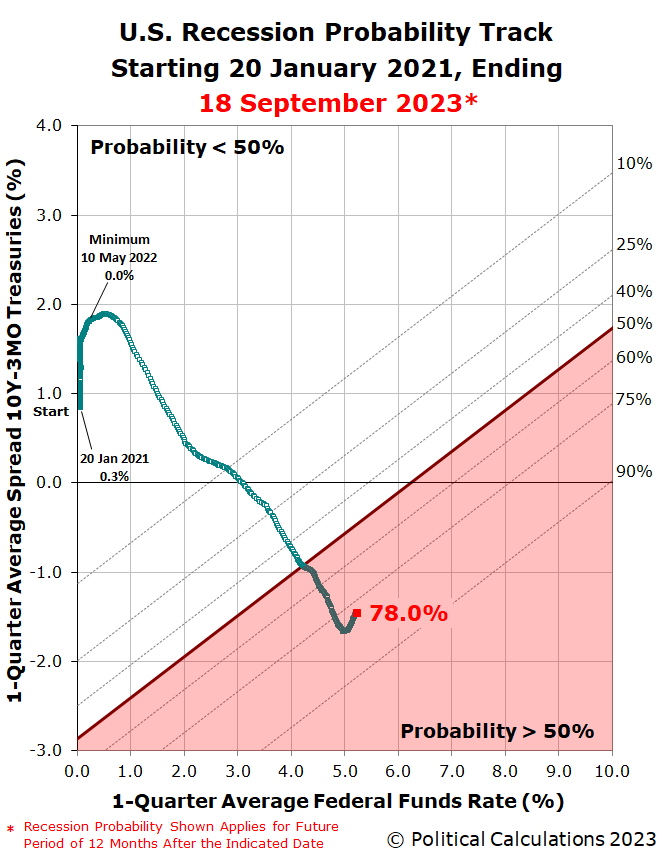The probability the U.S. economy will experience an official period of recession has begun to recede.
Those odds peaked at the time of our previous update, just before the U.S. Federal Reserve announced it would hike the Federal Funds Rate by another quarter point, bringing its target range up to 5.25-5.50%. This change had been widely expected.
But despite that increase, the probability of recession began to fall as longer term interest rates have risen. As measured by the spread between constant maturity 10-year and 3-month U.S. Treasuries, the treasury yield curve has become less inverted in the weeks since.
That reduced inversion is why the odds of recession have receded. Here's the latest update to the Recession Probability Track visualizing these latest developments:
The Recession Probability Track shows the current probability of a recession being officially determined to have begun sometime in the next 12 months, between the dates of 18 September 2023 and 18 September 2024, is 78.0%. The probability of recession peaked at 80.8% on 25 July 2023, which makes the period from July 2023 through July 2024 the mostly likely period in which the National Bureau of Economic Research will someday identify a point of time marking the peak in the U.S. business cycle before it entered a period of contraction.
With the recession probability starting to recede without a recession having been declared, it might seem as if the U.S. economy could escape a period of contraction. Such an outcome would be an exception however. Historically, the Recession Probability Track has peaked and begun to recede ahead of any recession declaration by the NBER. The event often marks when it's time to start the recession announcement countdown clock.
But not always. There have been exceptions in the past. The questions that matters now is will this be one of them and how confident are you of that possibility?
Analyst's Notes
The Recession Probability Track is based on Jonathan Wright's yield curve-based recession forecasting model, which factors in the one-quarter average spread between the 10-year and 3-month constant maturity U.S. Treasuries and the corresponding one-quarter average level of the Federal Funds Rate. If you'd like to do that math using the latest data available to anticipate where the Recession Probability Track is heading, we have a very popular tool to do the math.
We'll continue to follow the Federal Reserve's Open Market Committee's meeting schedule in providing updates for the Recession Probability Track until the U.S. Treasury yield curve is no longer inverted. Or rather, until the interest rate yield on the 3-month constant maturity U.S. Treasury is no longer higher than the yield on the 10-year constant maturity U.S. Treasury.
For the latest updates of the U.S. Recession Probability Track, follow this link!
Previously on Political Calculations
We started this new recession watch series on 18 October 2022, coinciding with the inversion of the 10-Year and 3-Month constant maturity U.S. Treasuries. Here are all the posts-to-date on that topic in reverse chronological order, including this one....
- U.S. Recession Probability Starts to Recede
- Probability of Recession Starting in Next 12 Months Breaches 80%
- U.S. Recession Probability on Track to Rise Past 80%
- U.S. Recession Probability Reaches 67%
- U.S. Recession Probability Shoots Over 50% on Way to 60%
- Recession Probability Nearing 50%
- Recession Probability Ratchets Up to Better Than 1-in-6
- U.S. Recession Odds Rise Above 1-in-10
- The Return of the Recession Probability Track
Image credit: A fortune teller sideshow photo by Nick Fewings on Unsplash.
Labels: recession forecast
Welcome to the blogosphere's toolchest! Here, unlike other blogs dedicated to analyzing current events, we create easy-to-use, simple tools to do the math related to them so you can get in on the action too! If you would like to learn more about these tools, or if you would like to contribute ideas to develop for this blog, please e-mail us at:
ironman at politicalcalculations
Thanks in advance!
Closing values for previous trading day.
This site is primarily powered by:
CSS Validation
RSS Site Feed
JavaScript
The tools on this site are built using JavaScript. If you would like to learn more, one of the best free resources on the web is available at W3Schools.com.

